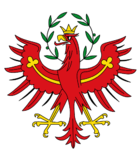2023 Tirol legislative election
| |||||||||||||||||||||||||||||||||||||||||||||||||||||||||||||||||||||
All 400 seats in the National Council 201 seats needed for a majority | |||||||||||||||||||||||||||||||||||||||||||||||||||||||||||||||||||||
|---|---|---|---|---|---|---|---|---|---|---|---|---|---|---|---|---|---|---|---|---|---|---|---|---|---|---|---|---|---|---|---|---|---|---|---|---|---|---|---|---|---|---|---|---|---|---|---|---|---|---|---|---|---|---|---|---|---|---|---|---|---|---|---|---|---|---|---|---|---|
| Registered | 23,061,914 | ||||||||||||||||||||||||||||||||||||||||||||||||||||||||||||||||||||
| |||||||||||||||||||||||||||||||||||||||||||||||||||||||||||||||||||||
| |||||||||||||||||||||||||||||||||||||||||||||||||||||||||||||||||||||
 |
|---|
| This article is part of a series on the politics and government of Tirol |
The 2023 Tirol legislative election was held on 5 May 2023, with 23,061,914 registed voters entitled to vote to elect deputies to the National Council. The election took place in 400 constituencies across Tirol under the Alternative Vote (AV) system.
The election resulted in a large swing against the governing Labour Party, towards the League Party. The Labour Party lost the 24 seat majority it had held, but no party attained the 201 seats necessary for a majority, resulting in a hung parliament. The League Party, led by Albrec Pescosta, won the most seats, but fell 47 seats short of a majority.
A hung parliament had been largely anticipated by the opinion polls in the run-up to the election, with parties engaging in some pre-election negotiations to pre-empt coalition negotiations.
Coalition negotiations began in the immediate aftermath of the election, with a number of potential agreements. After eight days of negotiations the League Party reached a coalition agreement with the Alliance Party and the Free Voters of Trentin on 13 May 2023. Ulrike Kindle resigned as Premier and Leader of the Labour Party the following day.
The election was seen as a failure for the anti-establishment parties, from whom the Freedom and Justice Party and Liberty Party lost twelve and ten seats respectively, rendering them irrelevant to any coaltion formation. The Greens and Free Voters of Trentin took extensive advantage of dissatisfaction in Provinzia Trentin with the performance of the Labour Party, with the Greens taking many of the urban areas that had historically supported the Internationale Party prior to the Ozidenta Affair and the Free Voters of Trentin taking many of the rural areas that were dissatisfied with Labour, but still distrusted the League Party.
Contents
Background
2017 legislative election
Party leadership changes
Boundary changes
Electoral system
Tirol uses the Alternative Vote system, a majoritarian instant run-off voting system with single member constituencies. The National Council has 400 members, elected to six year terms. These seats are distributed between the five provinces and Innsbruck Autonomous District.
Each voter may cast preference votes up to the number of candidates, writing "1" next to the highest preference candidate, "2" next to the second and so forth. To begin with, polling agents count the first preference votes, if the candidate with the highest proportion of votes has an absolute majority (in excess of 50%) of the votes, they are elected. If not, then the candidate with the lowest proportion of the first preference votes is eliminated, and the second preferences of their voters are allocated to the other candidates. This process is repeated until one candidate exceeds 50%+1 of the vote.
The use of this electoral system is widely viewed as lowering the barrier of entry for third parties compared to the Single Member Plurality system historically used in Tirol, and has seen a far larger number of candidates competing on average in each constituency. It was widely viewed as instrumental in allowing the Greens to become a considerable political force.
Political parties and candidates
The table below lists the parliamentary groups of the previous legislature:
| Logo | Name | Abbr. | Ideology | Leader | Cunsëi | Senât | ||
|---|---|---|---|---|---|---|---|---|
| Government | ||||||||

|
Labour Party Lëurparti dl Tirol |
LPdlT | Democratic Socialism | Ulrike Kindle | 392 / 700
|
6 / 18
| ||
| 60px | League Party Liga Parti |
Liga | Conservatism Traditionalism |
Albrec Pescosta | 212 / 700
|
7 / 18
| ||
| 60px | Freedom and Justice Party Liedità e Pruzessuela Parti |
LPP | Right-wing populism | Alexander Gauland | 47 / 700
|
2 / 18
| ||
| 60px | Liberty Party Liedità Parti |
LaP | Libertarianism | Christian Lindner | 24 / 700
|
0 / 18
| ||

|
Greens Vërc |
V | Green politics | Hugo Sollner Nina Spescha |
13 / 700
|
2 / 18
| ||
| 60px | Alliance Party Parti Allianze |
PA | Liberalism Free-market |
Matteo Fòuro | 6 / 700
|
0 / 18
| ||
| 60px | Internationale Party Parti Internationale |
PI | Marxism Internationalism |
Carlo Pasc | 3 / 700
|
1 / 18
| ||
| 60px | Adige Party Partie d'Adige |
PdA | Regionalism Ethnonationalism |
Clarence de Beautfort | 2 / 700
|
0 / 18
| ||
Party leaders
As the incumbent leader of the Labour Party, Ulrike Kindle retained the party's candidature for the Premiership. Despite rumours of a leadership challenge amidst poor performance in the opinion polls, no such contest was launched.
Albrec Pescosta was elected to be leader of the League Party on 4 April 2020, after a successful leadership challenge against the then incumbent Martin Bacan in the 2020 League Party leadership election.
Alexander Gauland retained the leadership of the Freedom and Justice Party after increasing the party's number of seats drastically in the 2017 election.
Campaign
Major issues
Debates
All the major media companies held televised debates, with the Radiobroadcasting Agency of Tirol holding three separate debates: one head-to-head between Kindle and Pescosta, one including all party candidates, and one of the party leaders of Provinzia Trentin, owing to the significant rise in support for the Free Voters of Trentin in public opinion polling.
| 2023 Tirol legislative election debates | |||||||||||||||||
|---|---|---|---|---|---|---|---|---|---|---|---|---|---|---|---|---|---|
| Date | Organisers | Venue | Region | Viewing figures (millions) |
P Present S Surrogate NI Not invited A Absent I Invited N No debate | ||||||||||||
| Labour | League | F&J | Liberty | Green | Alliance | VLT | |||||||||||
| 24 April | ART1 | ART Studio, Innsbruck | Tirol | TBA | S Killias |
S Sante |
P Gauland |
P Jen |
P Sollner |
P Fòuro |
P Meller | ||||||
| 26 April | ART Trentin | Pretoria Guild Hall, Trënt | Trentin | TBA | S Pesko |
A | NI | NI | S Menduri |
S Salaria |
P Meller | ||||||
| 30 April | ART1 | ART Studio, Innsbruck | Tirol | TBA | P Kindle |
P Pescosta |
NI | NI | NI | NI | NI | ||||||
Results
Summary
| 154 | 23 | 25 | 132 | 47 | 24 |
| League | VLT | ALL | Labour | Green | O |

| |||||||||
| Party | Leader | CDTs | First preference votes | ||||||
|---|---|---|---|---|---|---|---|---|---|
| Of total | +/– | Of total | |||||||
| League | Albrec Pescosta | 154 | 38.5% | 154 / 400 |
4,361,519 | 26.13% | |||
| Labour | Ulrike Kindle | 132 | 33.0% | 132 / 400 |
3,521,892 | 21.1% | |||
| Greens | Hugo Sollner | 47 | 11.8% | 47 / 400 |
2,841,736 | 17.03% | |||
| Alliance | Matteo Fòuro | 25 | 6.3% | 25 / 400 |
2,267,796 | 13.59% | |||
| Free Voters of Trentin | Bërtold Meller | 23 | 5.8% | 23 / 400 |
444,692 | 2.66% | |||
| Freedom and Justice | Alexander Gauland | 15 | 3.8% | 15 / 400 |
1,518,952 | 9.1% | |||
| Liberty | Amadio Irsara | 4 | 1.0% | 4 / 400 |
1,222,149 | 7.32% | |||
| Independent candidates | No leader | 0 | 0.0% | 0 / 400 |
– | 200,257 | 1.2% | ||
| Internationale | Tbd | 0 | 0.0% | 0 / 400 |
194,496 | 1.17% | |||
| Red Eagle | Joseph Planta | 0 | 0.0% | 0 / 400 |
– | 58,126 | 0.35% | ||
| National Corporatists | Felice Rudiferia | 0 | 0.0% | 0 / 400 |
– | 47,287 | 0.28% | ||
| Adige Party | Marc Rousseau | 0 | 0.0% | 0 / 400 |
11,700 | 0.07% | |||
| Total | 400 | 16,690,602 | 100% | ||||||
| Registered voters and turnout | 23,059,918 | 72.4% | |||||||
Results by state
10 closest constituencies
Government formation
Labour and the Greens initially agreed to extend their Senate agreement to the National Council, however, this left them with only 179 seats, still short of the 201 necessary. In order to facilitate negotiations with the liberal Alliance Party, the League Party ruled out any agreement with the Freedom and Justice Party on 6 May 2023. This left three alternative coalition agreements, Labour-Green-Alliance, Labour-Green-FVT and League-Alliance-FVT.






